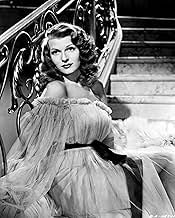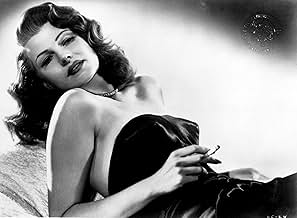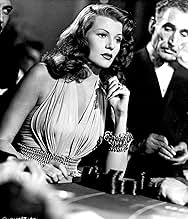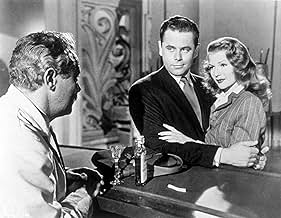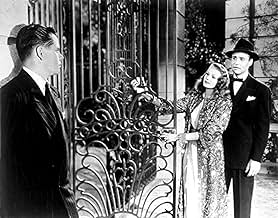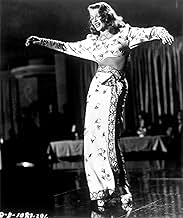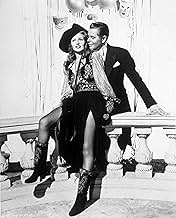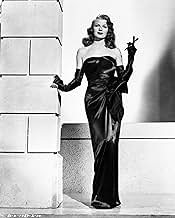Ein Gelegenheitsspieler, der eine Anstellung in einem Casino in Buenos Aires erhält, entdeckt, dass die neue Frau seines Chefs seine Ex-Geliebte ist.Ein Gelegenheitsspieler, der eine Anstellung in einem Casino in Buenos Aires erhält, entdeckt, dass die neue Frau seines Chefs seine Ex-Geliebte ist.Ein Gelegenheitsspieler, der eine Anstellung in einem Casino in Buenos Aires erhält, entdeckt, dass die neue Frau seines Chefs seine Ex-Geliebte ist.
- Auszeichnungen
- 4 Gewinne & 1 Nominierung insgesamt
- Gabe Evans
- (as Robert Scott)
- Thomas Langford
- (as Don Douglas)
- Newsman
- (Nicht genannt)
- …
- Gambler
- (Nicht genannt)
- Nightclub Patron
- (Nicht genannt)
- Blackjack Dealer
- (Nicht genannt)
- Girl at Carnival
- (Nicht genannt)
- Gambler
- (Nicht genannt)
- American Cartel Member
- (Nicht genannt)
Empfohlene Bewertungen
Hayworth is gorgeous and so is Ford. They are so good together and in this movie they are positively great. When great screen lovers are mentioned, I've often wondered why Ford and Hayworth aren't among them.
This is one of my absolute favorites.
Modern film femme fatales are a pale shadow by comparison, for example Linda Fiorentino or Sharon Stone. I'm not sure why. It could be either that nowadays allure is too much equated with sex or nudity (less tantalising than several dashes of suggestion) or maybe it's that present day equivalents are portrayed as hard as nails without the necessary mix of sadness and vulnerability.
Whatever, if you've never appreciated what the appeal of 40s noir is, this is definitely one to try.
Hayworth may either be the intruding wedge that comes between Glenn Ford and George Macready or the object of both men's romantic interests. From the initial meeting between Ford as two-bit gambler Johnny Farrell and Macready as Ballin Mundson the casino owner, an ambiguous, possibly homo-erotic, attraction is established between the two men. The lingering looks that they exchange can be read in several ways, but Bogie never looked into Cagney's eyes like Ford looks into Macready's. After Ford begins to work for Macready, his devoted care and slavish attention to his boss's needs exceed the bounds of employee and employer. When Hayworth moves into Macready's home as his new wife, Ford returns the key to the house as though he were a jilted lover. Ford's increasing jealousy becomes apparent after Hayworth's arrival on the scene, but it is unclear of whom he is jealous, Hayworth or Macready or possibly both. Perhaps Ford's character is as unsure of his own feelings as is the viewer, which makes the ambiguity even more intriguing. Macready's jealousy also grows as the heat between Ford and Hayworth intensifies, but, again, it is ambiguous of whom he is jealous.
With a dazzling performance by Hayworth, excellent black-and-white photography by Rudoph Mate, fine direction by Charles Vidor, and layers of psychological possibilities to ponder, "Gilda" is as golden as its title suggests.
Our story unfolds in Buenos Aires. Which as you watch the movie is easy to forget because there is absolutely no South American flavor to the proceedings. The story might as well be set in Milwaukee. Anyhow small-time gambler and successful cheater Johnny Farrell somehow finds himself running a high-class casino after the casino's owner, Ballin Mundson, takes a liking to him. Everything is going swimmingly until one day, completely out of the blue, Ballin returns home from a trip with a beautiful new wife in tow. This woman is going to cause all kinds of complications. This woman of course is Gilda and right from the start, from her first memorable moment on the screen, Hayworth takes hold of the movie. Gilda's a fascinating character with so much lurking under the surface. And what's on the surface ain't so bad either. Not for nothing was Hayworth the era's most popular pinup girl. A shame then that the movie can't take full advantage of the allure and talents of its star.
Hayworth is vibrant, exciting, bursting with life. The movie is not. In playing Johnny Farrell, the character we unfortunately spend more time with than we do with Gilda, Glenn Ford comes across as being somewhat dull. And his character is rather unlikable. The story contains some elements which fall flat. There's something about a tungsten cartel which involves some angry Germans. This of course has nothing to do with Gilda. Can we just get back to Gilda? Please? Somewhere along the way the story really gets bogged down and not even Hayworth can fully rescue it. Everyone will remember Hayworth's big moments. She makes quite the impression with her famous singing and dancing. Well dancing anyway as the singing voice isn't hers. But nevertheless that famous number, "Put the Blame on Mame", is quite the spectacle. Now who to put the blame on for surrounding the fabulous Hayworth with an otherwise very ordinary movie? You'll love Rita. Love the movie? That's a stretch.
The film is well made, and is shot in typical noir style. The story itself is fairly basic and offers no real surprises. The first half of the film is engrossing and builds up nicely, however the second half felt dull and bloated. The film would of been better off if it had twenty minutes cut out, the script would of felt a-lot tighter and better paced at ninety minutes.
The biggest strength of the film comes from the excellent performances. The three way dynamic between Johnny, Gilda and Ballin, is engrossing and fascinating to watch as the power struggle switches between the characters thought the duration of the film.
Over-all the films script was written well enough to keep me invested, and the ending makes up for the ponderous middle act. The performances are the main attraction of this film, especially the chemistry between Ford and Hayworth. The film isn't the best noir out there, but one that's still worth watching.
Wusstest du schon
- WissenswertesThere is a rumour that this film is the only time Rita Hayworth's real singing voice is heard, but that is not true. According to the bonus features from the DVD, Hayworth actually never recorded her own singing voice and was a talented lip-syncher. Anita Ellis dubbed almost all of her singing in this film. Hayworth always wanted to do her own singing, and Columbia Pictures chief Harry Cohn paid for her voice lessons, but she never developed a voice he considered strong enough to be used; Hayworth remained bitter about that for the rest of her life.
- PatzerWhen Farrell asks to cut the deck at the blackjack table, he shuffles the deck prior to the cut; this is not allowed.
- Zitate
Gilda: You do hate me, don't you, Johnny?
Johnny Farrell: I don't think you have any idea of how much.
Gilda: Hate is a very exciting emotion. Haven't you noticed? Very exciting. I hate you too, Johnny. I hate you so much I think I'm going to die from it. Darling...
[they kiss passionately]
Gilda: I think I'm going to die from it.
- VerbindungenEdited into Head (1968)
Top-Auswahl
- How long is Gilda?Powered by Alexa
Details
Box Office
- Weltweiter Bruttoertrag
- 5.999 $
- Laufzeit1 Stunde 50 Minuten
- Farbe
- Seitenverhältnis
- 1.37 : 1
Zu dieser Seite beitragen



